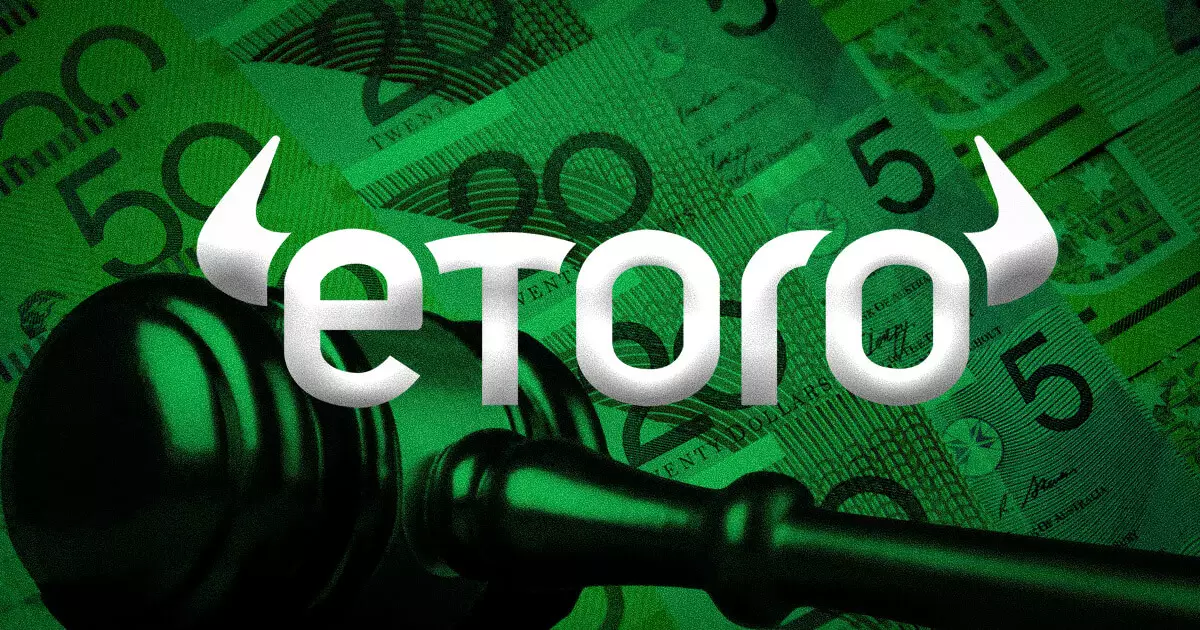The Australian Securities and Investments Commission (ASIC) has taken legal action against leading online trading platform eToro over alleged violations of financial regulations related to cryptocurrency derivative products. This lawsuit comes as a result of two-thirds of Contract For Difference (CFD) traders reportedly losing funds. The ASIC has accused eToro of contravening the design and distribution obligations under the Corporations Act 2001 from October 2021 to July 2023.
ASIC’s Disappointment
ASIC Deputy Chair Sarah Court expressed her disappointment over eToro’s alleged breaches, highlighting the platform’s reputation and market penetration. She emphasized that CFD target markets should be narrowly defined due to the significant risk that retail clients may lose all their deposited funds. Court also pointed out that CFD issuers must comply with the design and distribution obligations and cannot simply reverse engineer their target markets to fit existing client bases.
A CFD, or Contract For Difference, is a type of derivative that allows buyers and sellers to agree to pay each other the difference between the opening and closing prices of an asset. If the price goes up, the buyer makes money, and if the price goes down, the seller profits. However, CFDs carry significant risks, and retail clients can potentially lose all their deposited funds.
ASIC accuses eToro of defining its CFD target market too broadly, including retail clients with medium-risk tolerance but no experience or understanding of the risks of trading CFDs. This broad definition raises concerns about the suitability of these clients for CFD trading.
eToro’s Response
An eToro spokesperson has responded to the allegations, stating that the company is considering the ASIC’s claims and will respond accordingly. The spokesperson reassured clients that there is no impact or disruption of service and no material impact on eToro’s global business. They confirmed that eToro AUS is now operating with a revised target market determination in place for CFDs.
Commitment to Compliance
eToro reaffirms its commitment to adhering to the applicable rules and regulations in all jurisdictions where it operates. As a regulated platform, eToro aims to ensure consumer protection while still providing access for individual investors. The company’s local team in Sydney is dedicated to growing its business in Australia and providing the best possible customer experience.
The core of the lawsuit revolves around eToro’s alleged inadequacy in determining its target market for CFDs. ASIC claims that eToro did not define the types of retail clients suitable for trading CFDs effectively. Additionally, ASIC argues that eToro’s screening tests for retail investors were difficult to fail and did not effectively exclude customers for whom the CFD product was not appropriate. This alleged oversight exposed unsuitable investors to significant losses.
The CFDs offered by eToro allowed investors to speculate on the price movements of various underlying assets, including cryptocurrencies, forex, commodities, and stocks. ASIC contends that CFDs are generally unsuitable for most retail investors due to their complexity and leverage. Regulators, including ASIC, have previously taken administrative action to protect consumers from high-risk CFD trading that is not suitable for their financial circumstances.
During the period in question, eToro had nearly 30,000 retail clients trading CFDs. Of these clients, approximately 19,601 suffered realized losses totaling over AUD 26 million. Shockingly, over 9,800 eToro CFD clients admitted to having no financial knowledge, while over 11,000 acknowledged that they had never traded with leverage before. Based on these statistics, ASIC contends that eToro contravened its obligations by failing to act efficiently, honestly, and fairly. ASIC alleges that the screening tests implemented by eToro were ineffective and allowed unsuitable investors to trade CFDs, resulting in harm to consumers.
ASIC’s design and distribution obligations (DDO) require financial firms to design products that meet consumer needs and distribute those products in a targeted manner. A target market determination, which is mandatory under DDO, outlines the class of consumers for which a financial product is likely best suited. ASIC seeks penalties, compliance orders, and costs from eToro for its alleged contraventions. eToro has not yet publicly commented on the lawsuit, and the case will be heard in the Federal Court of Australia.
The ASIC’s lawsuit against eToro highlights the importance of stringent regulations and compliance in the financial industry, particularly concerning cryptocurrency derivative products. With growing concerns over consumer protection, regulators worldwide are prioritizing investor safeguards. This legal action serves as a reminder for trading platforms to adequately consider the suitability of their clients for high-risk financial products and to fulfill their obligations to act efficiently, honestly, and fairly.















